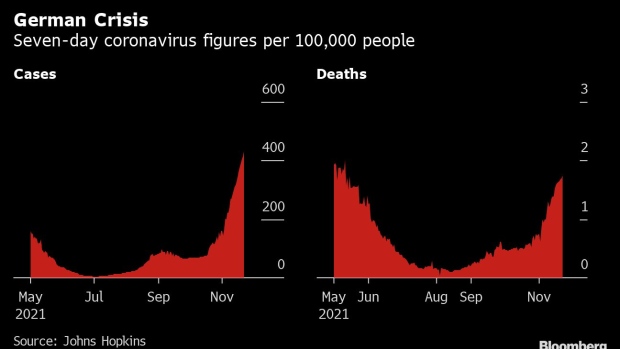Nov 23, 2021
Merkel and Her Successor Played Politics and Let Covid Run Wild
, Bloomberg News

(Bloomberg) -- On the sidelines of the Group of 20 summit last month, Chancellor Angela Merkel warned her likely successor that the coronavirus pandemic might require tougher curbs. But Olaf Scholz brushed aside the proposal, and Germany is now paying the price.
At the Rome meeting in late October, where Merkel introduced Scholz to other world leaders, she proposed convening the premiers of Germany’s 16 states to coordinate a response to rising Covid-19 infections. He dismissed it as unnecessary, according to people familiar with the discussions.
A lack of leadership in Europe’s largest economy has paved the way for the brutal outbreak and threatens to cloud the start of Scholz’s tenure, weakening him before his administration really gets started. The surge in infections is denting the public mood as Scholz prepares to assume control, fueling frustration with people sick of Covid restrictions and casting a pall over the prospects for economic recovery.
Behind the scenes, Scholz told Social Democratic state leaders not to join Merkel’s call for a meeting to discuss fresh pandemic curbs, said the people, who asked not to be identified because the talks were confidential. A spokesman for Merkel declined to comment, while spokespeople for Scholz didn’t immediately respond.
Instead, his party allies publicly waved off the need for nationwide restrictions, and the SPD joined with its prospective coalition partners, the Greens and the Free Democrats, to end emergency pandemic rules implemented by Merkel.
With little leverage to act after her party was voted out of office, Merkel let it go and a few days later was in the French wine-making town of Beaune, taking selfies and bumping fists with fans during a goodbye trip to President Emmanuel Macron. On Nov. 5, Germany’s coronavirus infection rate set a new record and hasn’t stopped rising since.
With Merkel on a farewell tour throughout much of the fall and Scholz haggling with his potential junior partners over policy details and ministerial posts, neither heeded the warnings and now Europe’s largest economy is in a full-blown crisis.
Just months after the pandemic seemed under control, German authorities are struggling to revive a stalled vaccination drive and discussing harsher curbs as infections surge to more than double the spring peak. Hospitals are already overflowing in hard-hit areas.
Germany’s Robert Koch Institute, the country’s public-health authority, had been warning of a fourth wave since the summer. But the pandemic doesn’t play well during a campaign, and so politicians pushed Covid to the sidelines for the Sept. 26 election and its aftermath.
Scholz, who is putting the finishing touches this week on a ruling alliance, will be tested by that failure. By the time he’s sworn in in early December, infections in Germany could have doubled again, based on recent trends.
The pro-business FDP was the driving force behind the move to unwind the emergency powers that Merkel had put in place and replace them with a framework that shifted more authority to state governments, said one official.
The liberal party has been openly dismissive of Merkel as their role in government came into focus. While Merkel was basking in Macron’s praise in Beaune, Marco Buschmann -- a senior FDP lawmaker and a close ally of its Chairman Christian Lindner -- rejected her call for restrictions on unvaccinated people.
The outgoing chancellor needed to be reminded “that she can’t just make corona policy as if there had been no election,” Buschmann said in a Nov. 3 Twitter post. “She’s now only in office as a caretaker.”
During this period, Scholz was largely out of the public eye, focusing mainly on coalition negotiations and steering clear of Covid.
On Nov. 11, the SPD politician finally addressed the pandemic. In a speech to the German parliament, he defended the decision of his allies to end emergency pandemic powers, but promised adequate measures to contain the disease.
“We have to make our country winterproof,” Scholz said, while announcing plans for the once-spurned meeting with state leaders.
On Nov. 18, officials finally met and agreed to restrict unvaccinated people from restaurants, bars and public events in areas with high hospitalization rates and promote booster shots, but they shied away from tougher curbs.
The measures were viewed as too little, too late. Lothar Wieler, head of the Robert Koch Institute, urged people to stay home, cancel large events, close poorly ventilated bars and clubs, reduce private contacts and avoid meeting people indoors. Germany is in “national emergency,” he said.
Merkel herself has recently stepped up pressure on Scholz.
“The virus doesn’t care whether Germany is currently in a phase with a caretaker government, which I lead, and ongoing negotiations about the formation of a new federal government,” she said a day before last week’s pandemic meeting.
On Monday, she said that the current outbreak is “worse than anything we’ve seen.” On Tuesday, her husband Joachim Sauer made a rare media appearance, with comments to Italian daily La Repubblica expressing disappointment over German resistance to getting immunized against Covid.
Jens Spahn, the outgoing health minister, had a more dire message, saying on Monday that “just about everyone in Germany will probably be either vaccinated, recovered or dead” by the end of this winter.
©2021 Bloomberg L.P.






